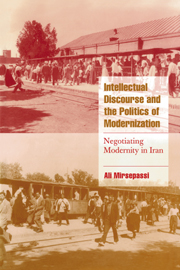Book contents
- Frontmatter
- Contents
- Acknowledgments
- Introduction: modernity and “culture”
- 1 Western narratives of modernity
- 2 Reconciling with the West's Other
- 3 The crisis of secularism and the rise of political Islam
- 4 Islam as a modernizing ideology: Al-e Ahmad and Shari'ati
- 5 German intellectuals and the culture of modernity
- 6 The tragedy of the Iranian Left
- 7 Modernities of our time
- Notes
- Bibliography
- Index
1 - Western narratives of modernity
Published online by Cambridge University Press: 06 October 2009
- Frontmatter
- Contents
- Acknowledgments
- Introduction: modernity and “culture”
- 1 Western narratives of modernity
- 2 Reconciling with the West's Other
- 3 The crisis of secularism and the rise of political Islam
- 4 Islam as a modernizing ideology: Al-e Ahmad and Shari'ati
- 5 German intellectuals and the culture of modernity
- 6 The tragedy of the Iranian Left
- 7 Modernities of our time
- Notes
- Bibliography
- Index
Summary
What does need to be remembered is that narratives of emancipation and enlightenment in their strongest form were also narratives of integration not separation, the stories of people who had been excluded from the main group but who were now fighting for a place in it. And if the old and habitual ideas of the main group were not flexible or generous enough to admit new groups, then these ideas need changing, a far better thing to do than rejecting the emerging groups.
Edward Said, Culture and Imperialism, p. xviIntroduction
As recent debates surrounding the phenomenon of “post-colonialism” have amply demonstrated, the European “other” played an important role in Western self-definition of its modernity. In order to understand the complex dialectics of modernity in Iran, it is essential to explore the Eurocentric and imperial narrative entrenched deep within its liberatory promises. This chapter, through readings of Montesquieu, Hegel, and Marx, explores how modernity created and preserved a conviction that the non-Western world could exist only as modernity's other. Although this narrative has recently come under serious challenge by critics such as Edward Said, Timothy Mitchell and Gayatri Spivak, it continues to hold remarkable hegemony in the media, popular culture, and among academics. As I show in my interpretations of Samuel Huntington's “clash of civilizations” thesis, and Bernard Lewis's explication of the “roots” of Muslim rage, efforts to re-envision modernity will be doomed to failure unless modernity's troubled genealogy is acknowledged, critiqued, and engaged.
Orientalism and the Occidentalist discontent
The publication of Edward Said's Orientalism in 1978 marked an important intellectual challenge to the then prevalent Eurocentric scholarship in Middle Eastern studies.
- Type
- Chapter
- Information
- Intellectual Discourse and the Politics of ModernizationNegotiating Modernity in Iran, pp. 15 - 53Publisher: Cambridge University PressPrint publication year: 2000
- 1
- Cited by

